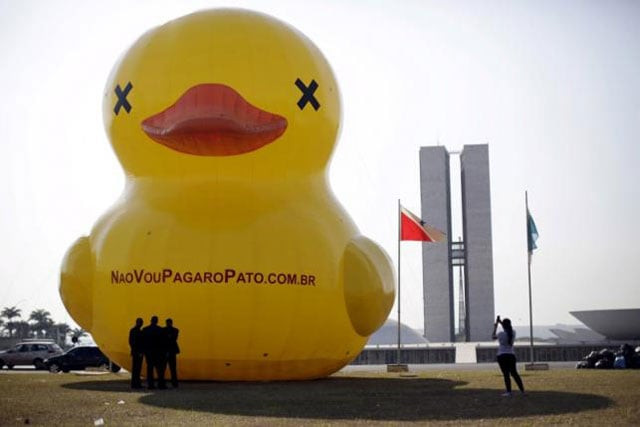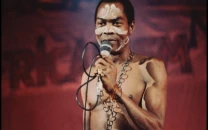Brazil's restive rich draft a duck to protest president
The duck and its brood have also hit the sands of Copacabana Beach

The duck and its brood have also hit the sands of Copacabana Beach. PHOTO: REUTERS
The 40-foot (12-meter) high duck presides over Sao Paulo's Avenida Paulista, Brazil's economic nexus. It has landed on the esplanade in the capital Brasilia, while its ducklings swam in the reflecting pool outside Congress.
The duck and its brood have also hit the sands of Copacabana Beach, a prime place to see and be seen in Rio de Janeiro.
Brazil's business leaders have adopted the duck to fight against what they describe as the economic quackery of Rousseff, a leftist who is facing growing pressure to quit and struggling to pull the economy out of its deepest recession in 25 years.
Austrian radio jockey punished for playing 'Last Christmas' 24 times
"Enough of paying the duck," said Paulo Skaf, president of the Federation of Industries of the State of São Paulo, in a video earlier this month urging Brazilians to demonstrate against Rousseff's government.
"To pay the duck" in Brazilian Portuguese means to unfairly pay for someone else's mistakes.
The term's origin is unclear but the saying is common enough for the federation to employ it against what it sees as the failures of Rousseff's administration.
Since she took office in 2011, Brazil's economy has gone from being one of the world's fastest growing major economies to one of its worst performers, contracting by 3.8 percent in 2015, as the commodities boom ended and a wide-ranging corruption scandal hit investor confidence.
Last year, when Rousseff proposed a new levy to help compensate plummeting tax revenues, the Sao Paulo federation inflated the giant duck in the capital Brasilia while its counterpart in Rio took it to Copacabana.
Now, the duck has taken up residence in Sao Paulo outside the federation building, striking a colorful note on the somber Avenida Paulista, which has hosted the biggest demonstrations supporting the ouster of Rousseff. She faces impeachment proceedings in Congress.
The marches have underscored growing tensions between classes in what remains one of the world's most economically stratified societies.
The recession has cost Rousseff and her ruling Workers' Party support among blue-collar Brazilians, who have borne the brunt of a downturn marked by the loss of 1.5 million jobs last year.
But the working class, even if disgruntled, has not wanted to associate itself with those who have most visibly turned out against Rousseff: white-collar types who never supported her to begin with.
Ohio judge uses verse to deny lawsuit
On Friday, as office workers toiled in the towers high over the duck's perch, a gaggle of pro-government demonstrators gathered for a rare display of support for Rousseff.
Denouncing anti-government protests as "nothing more than a privileged class out to defend their luxuries," Cleber Goncalves, a 36-year-old teacher, scoffed at the duck.
"It's just a silly symbol thought up by the elite," he said. "They are always trying to fool the people."



















COMMENTS
Comments are moderated and generally will be posted if they are on-topic and not abusive.
For more information, please see our Comments FAQ